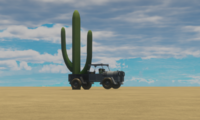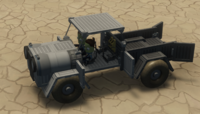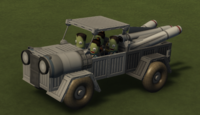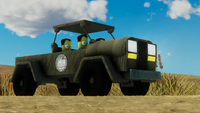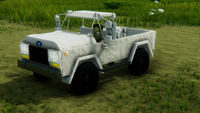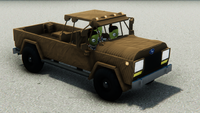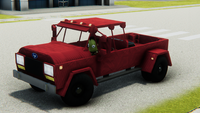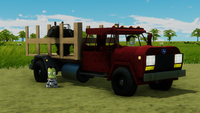Alkan Hauler: Difference between revisions
m (→Gallery) |
Slavic blin (talk | contribs) mNo edit summary |
||
| (9 intermediate revisions by 2 users not shown) | |||
| Line 8: | Line 8: | ||
|operators= [[Sahr]], [[Bastia]], [[Sahrland-Bastia]], [[Aontas]], [[Iroa]], [[Zokesia]] |
|operators= [[Sahr]], [[Bastia]], [[Sahrland-Bastia]], [[Aontas]], [[Iroa]], [[Zokesia]] |
||
|cost= 9,053 |
|cost= 9,053 |
||
| − | |produced= 9000~ |serv_end= |
+ | |produced= 9000~ |serv_end= N/A |
}} |
}} |
||
| Line 17: | Line 17: | ||
== Design == |
== Design == |
||
| − | The Alkon Hauler is unusually heavy and large for its vehicle class, weighing 3.030 tonnes on full load and taking up 2.1 metres of height, 2.1 metres of width and 4.7 metres of length. The increased |
+ | The Alkon Hauler is unusually heavy and large for its vehicle class, weighing 3.030 tonnes on full load and taking up 2.1 metres of height, 2.1 metres of width and 4.7 metres of length. The increased size affords it superior capalpower and strength compared to other models on the market, though loading of cargo is made harder by the heightened suspension. The cabin is able to seat 4 with ample room. Fore of the cabin is the 44 litre fuel tank and a small LFO-electric turbine, which was then used for better fuel efficiency but has now an iconic design feature across Alkan vehicles. Despite the increase in capalpower however it is only capable of reaching 63 km/h, which is only marginally faster than the sprint speed of the average [[Capal]] |
==Variants== |
==Variants== |
||
===[[Alkan Cementer]]=== |
===[[Alkan Cementer]]=== |
||
The Alkan cementer is a lengthened varient with cement apparatus in the rear. Beloved by construction workers and people with a body to hide alike. |
The Alkan cementer is a lengthened varient with cement apparatus in the rear. Beloved by construction workers and people with a body to hide alike. |
||
| − | === |
+ | ===TUFF-Series=== |
| − | Zokesian drivers in particular found the Hauler appealing and soon an export model was created for this market. Additionally, [[Logi Motor Company]] began production of domestically designed variants of the Hauler starting in |
+ | Zokesian drivers in particular found the Hauler appealing and soon an export model was created for this market. Additionally, [[Logi Motor Company]] began production of domestically designed variants of the Hauler starting in 2140. Dubbed the Logi TUFF series, the LFO engine was swapped to a V8 Diesel engine to match standard practices in [[Zokesia]]. These export models weighed more as a result, taking the already large 3.030 tonnes to 4.2 tonnes for the base model, 5.1 tonnes with the TUFF-250, and 5.3 tonnes with the TUFF-350. |
| + | |||
| + | === TUFF-450 === |
||
| + | The Logi [[TUFF-450]] Concentrator is a line of vehicles based on the Alkan Hauler's cab and produced in Zokesia as a commercial vehicle. |
||
=== Gallery === |
=== Gallery === |
||
| Line 30: | Line 33: | ||
File:Hauleralkan4.png|Humanitarian supplies being delivered to children in Grestin. |
File:Hauleralkan4.png|Humanitarian supplies being delivered to children in Grestin. |
||
File:ZokeScreenshot15305.png|Zokesian foreign export model. |
File:ZokeScreenshot15305.png|Zokesian foreign export model. |
||
| − | File: |
+ | File:ZokeScreenshot15359.png|The Logi TUFF - A heavily modified version of the Hauler for Zokesian civilian use. |
File:ZokeScreenshot15343.png|Logi TUFF-250 |
File:ZokeScreenshot15343.png|Logi TUFF-250 |
||
| − | File: |
+ | File:ZokeScreenshot15346.png|Logi TUFF-350 |
| + | File:ZokeScreenshot27654.png|Logi TUFF-450 |
||
</gallery> |
</gallery> |
||
</div> |
</div> |
||
Latest revision as of 21:10, 26 November 2025
|
Alkan Hauler
|
|||||
|---|---|---|---|---|---|
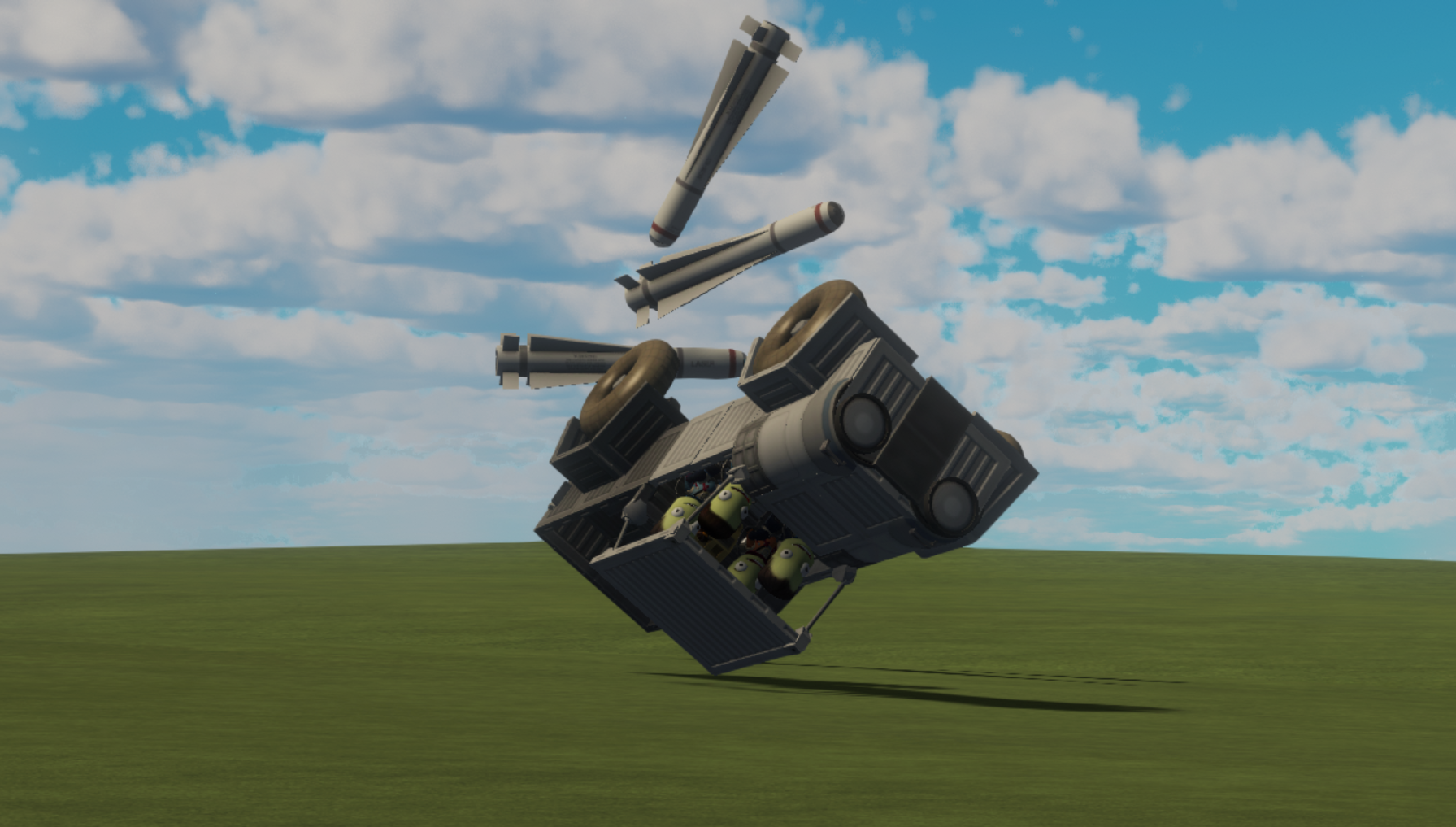 |
|||||
| Role | Truck | ||||
| National Origin | Sahr | ||||
| Production History | |||||
| Designer | Alkan Tractor Company | ||||
| Unit Cost | 9,053(√) | ||||
| Service History | |||||
| In Service | |||||
| 2107 - N/A | |||||
| Used By | Sahr, Bastia, Sahrland-Bastia, Aontas, Iroa, Zokesia | ||||
The Alkan Hauler is a light truck originating from Sahr. It has seen usage across Kolus and Veiid, and elsewhere in lesser cases.
Development
The 2107 Hauler was created shortly after the company began. It required a large amount of capalpower and off road capability as Sahrland was a predominantly Capal based economy without infrastructure.
Design
The Alkon Hauler is unusually heavy and large for its vehicle class, weighing 3.030 tonnes on full load and taking up 2.1 metres of height, 2.1 metres of width and 4.7 metres of length. The increased size affords it superior capalpower and strength compared to other models on the market, though loading of cargo is made harder by the heightened suspension. The cabin is able to seat 4 with ample room. Fore of the cabin is the 44 litre fuel tank and a small LFO-electric turbine, which was then used for better fuel efficiency but has now an iconic design feature across Alkan vehicles. Despite the increase in capalpower however it is only capable of reaching 63 km/h, which is only marginally faster than the sprint speed of the average Capal
Variants
Alkan Cementer
The Alkan cementer is a lengthened varient with cement apparatus in the rear. Beloved by construction workers and people with a body to hide alike.
TUFF-Series
Zokesian drivers in particular found the Hauler appealing and soon an export model was created for this market. Additionally, Logi Motor Company began production of domestically designed variants of the Hauler starting in 2140. Dubbed the Logi TUFF series, the LFO engine was swapped to a V8 Diesel engine to match standard practices in Zokesia. These export models weighed more as a result, taking the already large 3.030 tonnes to 4.2 tonnes for the base model, 5.1 tonnes with the TUFF-250, and 5.3 tonnes with the TUFF-350.
TUFF-450
The Logi TUFF-450 Concentrator is a line of vehicles based on the Alkan Hauler's cab and produced in Zokesia as a commercial vehicle.
